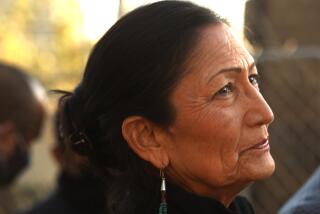Foster Son Loses Ruling
- Share via
SAN FRANCISCO — A person reared by a nonbiological parent who dies without a will cannot inherit property if the parent failed to legally adopt the child or show an intention to adopt, the California Supreme Court ruled Thursday.
The unanimous decision, which affects foster children and others who are raised by people other than their biological parents, leaves California with rules on inheritance that strongly favor blood relatives, even distant ones.
The case decided Thursday was brought by Terrold Bean, 50, who had been raised as a foster son by Pat and Kathleen Ford since the age of 2. He lived in the Fords’ San Francisco home until he was 20, and cared for the couple until their deaths.
Bean called the couple “Mom” and “Dad,” and they called him “son.” But the Fords never attempted to adopt Bean, even though his biological mother lost all rights to him when he was 4. Pat Ford, the last in Bean’s foster family to die, also failed to make a will.
Ford’s $640,000 estate now will go to his nearest blood relatives, a niece and nephew who had not seen the man for more than 15 years and did not attend his funeral.
Bean was hoping to inherit under a legal concept known as “equitable adoption,” which allows individuals with strong familial bonds to the deceased to be treated in some circumstances as if they had been adopted.
Some states, including Texas, interpret equitable adoption broadly, but under the court’s ruling, that will not be the case in California.
“A person with whom the decedent had a close, caring and enduring relationship may often be seen as more deserving of inheritance than the heir or heirs at law,” conceded Justice Kathryn Mickle Werdegar, who wrote the court’s opinion.
But according to state law, “equitable adoption in California is neither a means of compensating the child for services rendered to the parent nor a device to avoid the unjust enrichment of other, more distant relatives,” she said.
To inherit under the “equitable adoption” concept, individuals must prove by clear and convincing evidence that the dead parent had intended or promised to adopt them, or had publicly held them out to the community as their true child, the court ruled.
Bean could not meet this standard, even though there was plenty of evidence that he loved the Fords, considered them his family and performed the duties of a son. Both a trial court and an appeals court had ruled against Bean before the state high court took up the case.
Mary Catherine Ford, the Fords’ only biological child, was close to Bean and described him as her “brother” in a life insurance application. When she died in 1999, following the loss of her mother two decades earlier, it was Bean who had to break the news to her father.
Pat Ford, a stroke victim, lived the last years of his life in a nursing home, and Bean visited him regularly there.
A family friend of the Fords had testified that the couple wanted to adopt Bean but feared he would have to move out during the proceedings.
“Although the evidence showed the Fords and Bean enjoyed a close and enduring familial relationship,” Werdegar wrote, “evidence was totally lacking that the Fords ever made an attempt to adopt Bean or promised or stated their intent to do so.” Bean, she added, never took the Ford name.
Patrick Sullivan, Bean’s lawyer, said the ruling “took the equity out of equitable adoption.”
“If they have a close and familial relationship, why do they think they have to adopt him?” Sullivan asked.
The decision means “that a 45-year-old, de facto parent-child relationship really doesn’t create any kind of inheritance rights.”
Bean, a butcher who lives in Oakland, could not be reached for comment. Sullivan said Bean was working Thursday and did not want to be told the outcome of the case until the end of the day. Sullivan said he may ask the court to reconsider its ruling.
Thomas J. Williams, who represented John J. Ford III, the nephew of Pat Ford, said the court was bound by the law to rule the way it did, even though some justices expressed strong sympathy for Bean during a hearing in November.
“They couldn’t legislate,” Williams said.
A decision in favor of Bean also might have deterred people from taking in foster children out of fear that they would one day demand their estate, Williams said.
Bean “was fed and schooled,” Williams said. “What more did he want?”
More to Read
Sign up for Essential California
The most important California stories and recommendations in your inbox every morning.
You may occasionally receive promotional content from the Los Angeles Times.











